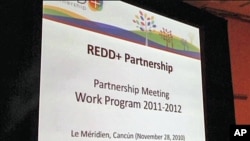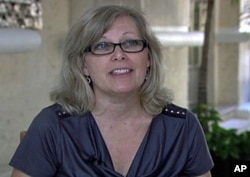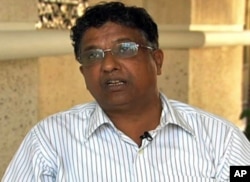Expectations for concrete results at a climate change conference getting under way in Mexico are low, following the failure of world leaders to endorse a legally binding treaty to limit greenhouse gas emissions at last year's meeting. Participants hope to advance a few key steps toward achieving an agreement that will reduce worldwide emissions.
The climate change conference is taking place in hotel conference rooms that overlook some of the world's most beautiful white sand beaches. However, most of the tourists here are little concerned with the United Nations event – they came here for the sun and the sand.
But official delegates and representatives of non-governmental organizations are spending most of their time indoors, focusing on what they fervently believe is an effort to save the planet from the dire consequences of global warming.
One area where an advance is quite possible is a program to counter deforestation called REDD, an acronym for Reducing Emissions from Deforestation and Degradation.
Forests are important because they absorb carbon dioxide from the atmosphere and help cool the planet.
Various groups working to facilitate an agreement on this issue have been meeting here to develop a plan for the payment of up to $38 billion by developed nations to support forest preservation in poor nations.
Such a scheme would require an international mechanism to guarantee transparency and effectiveness.
"There is already quite a lot of agreement around these key elements. It is just a matter of putting them in a decision, and moving forward with that," Saint-Laurent added.
She says the transfer of so much money to poor nations can only work if a reliable agreement is in place.
"At the heart of it is money, and the potential for this money to do really good things, but also the potential for it to do really bad things, if not done right, we really need this decision in place to start guiding how activities are rolling out in different countries," she added.
Syed Mahmood Nasir, a delegate from Pakistan, says disaster in his homeland has convinced people of the urgent need to confront global warming.
"After the recent floods it has become the main concern, because the floods were so devastating, and, now, people are seeing that these were due to climate change," said Nasir.
He says his country favors implementation of the REDD program because it provides a market mechanism to counter the profits available to those who cut down forests for lumber.
"Ideally, when REDD will work, it will be a market-based system where someone is paying for a ton of carbon sequestered in a country like Pakistan with community involvement and with informed prior consent of the communities," he added.
Not all activity at this conference involves intense meetings.
The Mexican hosts are providing conference participants with nightly entertainment as well as social events, with a focus on environmental education.
There are also activities for children here at a Climate Change Village, where educational displays and activities help kids get on top of the issues.
Environmental experts say children should be included here, since they are the ones who will face the consequences in the future, if the world fails to take effective action now.







